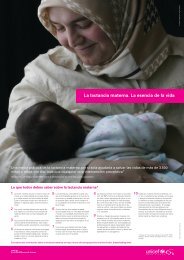SEXUAL ABUSE AND EXPLOITATION OF BOYS IN SOUTH ASIA A ...
SEXUAL ABUSE AND EXPLOITATION OF BOYS IN SOUTH ASIA A ...
SEXUAL ABUSE AND EXPLOITATION OF BOYS IN SOUTH ASIA A ...
You also want an ePaper? Increase the reach of your titles
YUMPU automatically turns print PDFs into web optimized ePapers that Google loves.
9.1 Research<br />
Prioritize research activities<br />
• Conduct consultations with government, NGOs, civil society actors (including<br />
children and young people) and donor partners to identify knowledge gaps and needs.<br />
• Prioritize and coordinate research activities.<br />
Improve quality of research<br />
• Build capacity of NGOs on research methodologies.<br />
• Promote collaborative research efforts between professional researchers and NGO<br />
research teams.<br />
• Establish a mechanism for submitting research drafts for peer review.<br />
Develop evidence-based foundation information. The needs include:<br />
• National quantitative studies on sexual abuse of boys and girls.<br />
• National quantitative studies on sexual exploitation of boys.<br />
• Qualitative studies on sexual abuse and exploitation of boys.<br />
• Studies to examine the linkages between child sexual abuse and sexual exploitation.<br />
• Studies to examine the linkages between vulnerable situations of boys (labour,<br />
migration, street living) and sexual abuse and exploitation.<br />
• Studies directed at boys from disadvantaged groups, including ethnic minorities and<br />
disabled children.<br />
Develop evidence-based information for programme application. The needs include:<br />
• Children’s views and perceptions of sexual abuse and exploitation and of the services<br />
available for them.<br />
• Research on gender relations and gender socialization, including construction of<br />
masculinity, and information on male sexuality.<br />
• Psychological impact of sexual abuse and exploitation on boys.<br />
• Family unity and dysfunction, roles of mothers and fathers, parenting practices,<br />
children’s participation in the family.<br />
• Culture-based definitions of sexual abuse, maturity of children and sexual<br />
relationships; cultural barriers to reporting; causes of stigma of abuse victims.<br />
• Perpetrators of child sexual abuse and exploitation.<br />
9.2 Legislation<br />
Assure that national law fully complies with relevant international standards and<br />
instruments and is fully implemented by ensuring that:<br />
• All relevant international human rights instruments are ratified;<br />
• International human rights standards are fully and appropriately incorporated into<br />
national law and/or that all national law – civil, criminal, customary and other relevant<br />
law – fully complies with them, and that they can be invoked directly and enforced<br />
through the courts, including by children and/or their representatives;<br />
• Boys and girls – and in particular children with relevant experiences – are involved in<br />
reviewing laws and developing legal frameworks to combat sexual exploitation;<br />
149










